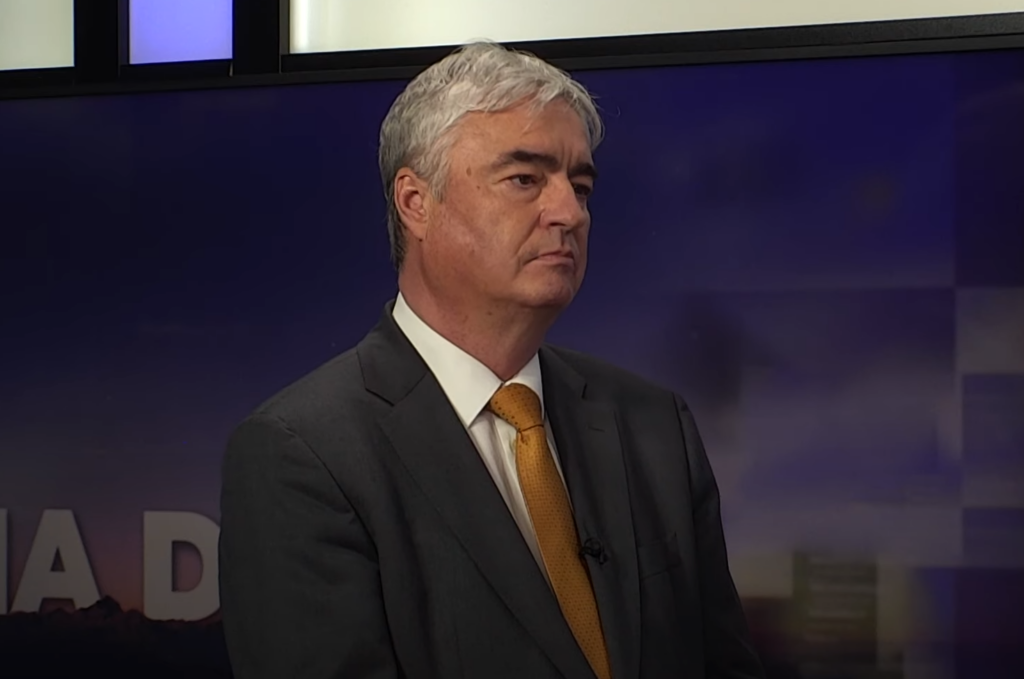“We will win this lawsuit,” said MEP Dr Milan Zver, adding that this is not just about winning but also about answering the question of whether Brussels can intervene in areas where it should not.
The President of the Slovenian Democratic Party (Slovenska demokratska stranka – SDS), Janez Janša, and Member of European Parliament, Dr Milan Zver, recently revealed key internal European Commission documents from the visit of European Commission Vice-President Věra Jourová to Slovenia. More than a year has passed since her visit, but the public has still not received convincing explanations of what exactly she was doing that day at the Constitutional Court, which then ruled positively on the amendment to the Radio-Television Slovenia Act, allowing for a political takeover of the national media.
The whole story has been unfolding for almost thirteen months now, and even at the beginning, when the Commissioner for Values and Transparency, Věra Jourová, visited Slovenia, MEP Dr Milan Zver found it strange that she decided to visit the Constitutional Court. “It was a relatively unusual visit, especially as it took place at a time when the implementation of the Radio-Television Slovenia Act had been temporarily halted by the Constitutional Court. Anyone who understands politics knows what this visit was supposed to be about. I immediately asked for documentation,” said MEP Dr Zver.
In response, Jourová sent him hundreds of pieces of paper, but not the key document. Namely, a reminder for Jourová for her meeting with the President of the Constitutional Court, Matej Accetto, which contains three points. “The first two are published, but the third is still hidden. We suspected even then that this was a conversation about the national media outlet, Radio-Television Slovenia (RTV), which should not have happened.” Jourová intervened in the Slovenian political space and the Slovenian legislative process. This is a major offence and is illegal under the EU Treaty. It is an illegal interference in Member States in areas that are not common policies, MEP Dr Zver pointed out.
The European Union Ombudsman was also asked for advice and sided with MEP Dr Zver, requesting and setting a deadline of 15 days for the European Commission to send all the requested documents. “This did not happen, and again, it took them quite some time to send the documents, which show political interference in Slovenian affairs.”
Documents reveal political interference
The documents talk about political polarisation, that on the one hand, there are supporters of the old government, and that it is positive that on the other hand, there are supporters of the new government, i.e. the media and some NGOs. The documents also denounced some media, including Nova24TV and Demokracija, and names such as Aleš Hojs and Uroš Urbanija – so they went far into politics, and in a biased way, according to MEP Dr Zver.
The documents also revealed that Jourová was saying that the Constitutional Court had adopted an untrustworthy document when it temporarily halted the implementation of the Radio-Television Slovenia Act. Incidentally, her previous position was already worrying, as she publicly supported the new Radio-Television Slovenia Act.
“We are accusing her not only of illegal actions, because she has violated fundamental EU treaties, but also of not acting responsibly and transparently, even though she is the Commissioner for Transparency.”
A black mark against the European Commission
Censoring documents is also not legal, pointed out the MEP. Věra Jourová should have handed over everything she was asked for, according to the European Ombudsman. “We have also asked for electronic communication from the authorities involved in this visit, but we have not received it. If we want to preserve the reputation of the European Commission, such political interventions should not happen,” Milan Zver stressed.
Was this done in close cooperation with Slovenian politics?
There must have been close cooperation with the Slovenian political authorities, because both the Commissioner and the Slovenian MEP Irena Joveva assessed the role and importance of the European Freedom of the Media Act in the same way. “They both mentioned that it is a good tool to put pressure on the governments in Hungary and Poland. They were probably also referring to Slovenia. Jourová succeeded in this, because the intervention resulted in a change of position of the Constitutional Court,” MEP Dr Zver believes.
“We will win this lawsuit.”
As the consequences are severe, including a change in the programming scheme, MEP Dr Zver called on Commissioner Jourová to resign immediately, even though she has not sent all the documentation yet. The censored part most probably says that the Radio-Television Slovenia Act was also discussed at the Constitutional Court. Zver says he will continue his fight for the truth and take the case to the European Court. “We will win this case,” he said, adding that this is not about winning but about getting to the bottom of the question of whether Brussels can intervene in areas where it should not.
A. G.


